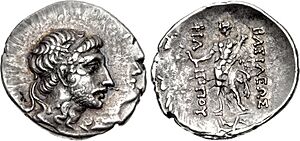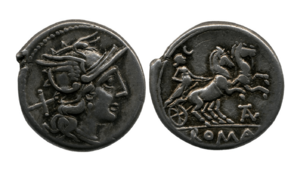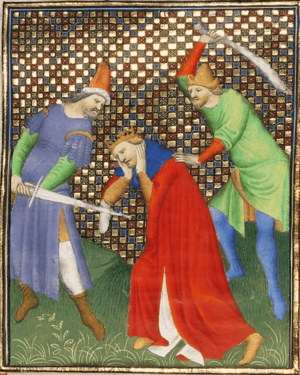Andriscus facts for kids
Quick facts for kids Andriscus (Philip VI) |
|
|---|---|

Coin issued by Andriscus during his reign; Greek inscription reads ΒΑΣΙΛΕΩΣ ΦΙΛΙΠΠΟΥ (King Philip)
|
|
| Basileus of Macedonia | |
| Reign | 149–148 BC |
| Predecessor | Perseus (as king) Roman client republics in Macedon (actual) |
| Successor | Roman conquest (Alexander VI) |
| Born | Unknown Presumed to be Adramyttium in Aeolis (modern-day Edremit, Balıkesir, Turkey) |
| Died | 146 BC Rome, Roman Italy |
| Greek | Ἀνδρίσκος (Andrískos) Φίλιππος (Philippos) - royal name |
| House | Antigonid dynasty (claimed) |
| Father | Perseus of Macedon (claimed) |
Andriscus (Ancient Greek: Ἀνδρίσκος, Andrískos; fl. 154/153 BC – 146 BC) was a Greek man who claimed to be a prince. He became the last independent king of Macedon in 149 BC. He called himself Philip VI (Greek: Φίλιππος, Philipos).
Andriscus claimed to be Philip, a son of Perseus. Perseus was the last true king of Macedon. Andriscus's rule lasted only one year. The powerful Roman Republic defeated him during the Fourth Macedonian War.
Ancient writers say Andriscus was a fuller (someone who cleans and thickens cloth). He came from a town called Adramyttium in western Anatolia. Around 153 BC, he claimed to discover his royal background.
He traveled to the court of Demetrius I Soter, a king in Syria. Andriscus asked for help to reclaim his "throne." Demetrius refused and sent him to Rome. The Romans thought he was harmless and sent him away to an Italian city.
But Andriscus escaped. He gathered support, especially from Thrace. He then invaded Macedon, defeating Rome's allies there. He became king. The Romans quickly sent their army. After some early wins, Andriscus was defeated. The Roman general Quintus Caecilius Metellus Macedonicus captured him. Macedon was then taken over by Rome.
Andriscus was kept in prison for two years. In 146 BC, he was paraded in Metellus's victory parade in Rome. After this, he was executed. Because of his revolt, the Romans created the Roman province of Macedonia. This ended Macedon's independence and brought the region under permanent Roman control.
Contents
Andriscus's Early Life and Claims
Details about Andriscus's early life are not very clear. Most people believe he was a fuller from Adramyttium. This town was in western Anatolia. We don't know his exact birth date.
Andriscus claimed he was "of maturity" when he said he was royalty in 154 BC. He said a man from Crete raised him in Adramyttium. He claimed he was educated there until he was a teenager. After the Cretan died, he said his foster mother raised him.
When he grew up, he claimed his mother gave him a sealed letter. This letter was supposedly written by King Perseus himself. She also told him about two hidden treasures. These treasures were in Amphipolis and Thessalonica. He later used these stories to support his claim.
Ancient writers all said he was an impostor, meaning he was pretending. They dismissed his story as false. However, some historians think there's a small chance his claims were true. His biggest advantage was how much he looked like King Perseus.
Around 154 or 153 BC, he left Pergamon for Syria. There, he announced he was the secret son of Perseus. He said his mother told him to leave Pergamon. She wanted him to avoid the anger of the pro-Roman King Eumenes II.
Seeking Support in Syria
Andriscus first tried to get support in Syria. Ancient writers Livy and Cassius Dio say he went straight to the Seleucid king, Demetrius I Soter. He told the king he was the rightful heir.
Another writer, Diodorus Siculus, tells a different story. He says Andriscus was already a soldier in Demetrius's army. Because he looked like the former Macedonian king, his fellow soldiers joked about him. They called him "son of Perseus." These jokes soon became serious. Andriscus decided to use this chance and claimed he was indeed Perseus's son.
Andriscus asked King Demetrius to help him get back his "ancestral" throne. He found a lot of support among the people in Syria. There were even protests in the capital city, Antioch. Many people in Syria were of Macedonian descent. They felt strongly against Rome. They were eager to help Andriscus. Some even wanted to remove King Demetrius if he didn't help.
But Demetrius was not convinced. He might have been scared of Rome. He had Andriscus arrested and sent him to Rome.
Andriscus in Rome
In Rome, Andriscus was brought before the Senate (Rome's governing body). Dio wrote that he was "in general contempt." This means people looked down on him. They thought he seemed like an ordinary person. His claim seemed clearly false to them.
The Romans believed his claim was fake. They knew the real Philip had died in Alba Fucens two years after his father Perseus. They thought Andriscus was harmless. So, they simply sent him away to an Italian city. But he managed to escape.
He fled Italy and went to the Greek city of Miletus.
Gathering Allies
In Miletus, Andriscus tried to get more support. He attracted a lot of attention and sympathy. When the leaders of Miletus found out, they arrested him. They asked Roman officials what to do. The Romans thought Andriscus was unimportant. They told the Miletans it was safe to let him go.
Andriscus continued his travels through Ionia. He met people who used to know King Perseus. He even met Kallipa, who was once a companion of Perseus. She was now married to Athenaios, the brother of King Attalus II Philadelphus of Pergamon. Kallipa was Macedonian by birth. She had connections to the old Macedonian royal family. She believed his claim and agreed to help him. She gave him money and slaves. She probably told him to go to Thrace. She thought he would find followers there.
He was also welcomed in Byzantium. Finally, he arrived in Thrace. There, he met Teres III. Teres had married Perseus's granddaughter. He was also the son of Cotys IV, who had been an ally of Perseus. Teres and other Thracian leaders were very excited to meet him. Andriscus had a coronation ceremony at Teres's court. He was given a few hundred Thracian soldiers. Then he began his campaign.
Taking Control of Macedon
Andriscus's first attempt to invade Macedon failed. He didn't get much support from the Macedonians at first. This made the Romans feel too confident about him. But soon, he met a force of Rome's Macedonian allies. He defeated them in Odomantice. Then he invaded Macedon itself. He defeated Rome's allies near the Strymon river.
The people cheered him on. He crowned himself king in the old Macedonian capital of Pella. This happened in 150 or 149 BC.
Widespread Support
At first, the Macedonians were not very excited about Andriscus. But his victories made him popular. He gained widespread support in Macedon. Many Macedonians felt strongly against Rome. They were happy to overthrow the old system.
Not everyone supported Andriscus. Wealthy people and the upper classes were more hesitant. But poorer people were more enthusiastic. Most people were in his favor. His claims seemed more real when he correctly predicted where two treasures were hidden. He said these were mentioned in the "sealed writing" from Perseus.
Even if people doubted his story, they wanted to believe him. They hoped that a restored Macedonia would free them from Roman rule. The longer they had been under Roman control, the happier they were to think of a Macedonian king from the old family.
However, some historians think his support might not have been as widespread. They believe many Macedonians remained loyal to Rome. After his defeat, Rome did not punish Macedon as severely as it did Corinth and Carthage. This might suggest that not all Macedonians supported Andriscus.
Andriscus's Time as King
Military Actions
Andriscus's time as king was mostly spent fighting wars with Rome. After taking over Macedon, he made his army bigger. He began campaigns to conquer Thessaly. This area was an important part of the old Macedonian kingdom.
At first, he faced small forces of Roman allies in Greece. He also fought a few Roman units and some remaining Roman allies in Macedon. But soon, the Romans sent a large army. It was led by a general called Publius Juventius Thalna. Their goal was to defeat Andriscus.
Thalna seemed to underestimate Andriscus's strength. He didn't realize how much the king's army had grown. Andriscus attacked Thalna in Thessaly. The details of the battle are not clear. But Thalna was killed, and his army was almost completely destroyed.
This was the worst defeat Rome suffered against the Macedonians. One writer, Florus, noted the irony. He said Rome, "invincible against real kings," was defeated by this "imaginary and pretended king." This victory greatly increased Andriscus's fame. He made an alliance with Carthage. His popularity at home grew a lot. This allowed him to crush any remaining resistance and conquer Thessaly.
Dealing with Other Nations
At first, Andriscus tried to talk with Rome. He wanted them to accept him as king. But when it was clear they wouldn't, he adopted a strong anti-Roman policy. He continued to work closely with his Thracian allies. They had helped him become king. They kept providing him with many soldiers during his reign.
Other countries became much more interested in him after his victory over Thalna. As mentioned, Carthage allied with him. Carthage was fighting Rome in the Third Punic War. They promised him money and ships. However, these could not be sent before he was finally defeated.
Many people in Greece felt sympathy for Andriscus. But the Achaean League (a group of Greek city-states) remained loyal to Rome. They continued to fight against him. King Attalus II Philadelphus of Pergamon also stayed strongly pro-Roman. The people of Pergamon were very scared of a strong Macedonia rising again near their borders.
Rules and Policies
At home, Andriscus put in place strong anti-Roman rules. He also opposed those who wanted a republic (a government without a king). Ancient historians described him as cruel and a tyrant. Some historians suggest this was just how he dealt with his opponents. He punished those who supported Rome or a republic.
However, it is also possible that he was indeed a harsh ruler. His punishments became much worse after his victory over Thalna. This made him lose a lot of his popularity. This would have serious consequences for him later.
Coins of Andriscus
Historians debate how many coins Andriscus made. Some think many of his coins were made by stamping new designs over old ones. He might have used coins from previous Macedonian kings, republics, or even Roman coins.
He made a very small number of silver coins called drachmae. On these coins, he showed himself as a Hellenistic king. He put Herakles (a Greek hero) on the back. Only three of Andriscus's coins are known today. Two of them were made by stamping over older coins. One was over a coin from the Thessalian League. The other was over a Roman denarius. So, he might have used the Roman coins he captured after defeating Thalna to make his own. His coins were also not very good quality. This was because his reign was short. He also needed to reuse old coin molds and make coins quickly for the war.
Some non-royal coins have also been found from his time. These might have been made by the remaining pro-Roman groups. Some also think Andriscus was more open-minded than sources suggest. He might have allowed some independent coin making.
Andriscus's Defeat and Death
Thalna's defeat damaged Rome's reputation in the East. It made the Roman Senate realize how serious Andriscus's revolt was. They sent a full army of two legions. It was led by the general Quintus Caecilius Metellus. His job was to defeat Andriscus and stop the uprising.
Metellus arrived in Greece in 148 BC. He marched along the coast of Thessaly. He advanced by land and sea. At the same time, the allied Pergamon fleet threatened northern Macedonia's coast. To defend against both attacks, Andriscus took a defensive position. He placed his main army at Pydna. Metellus attacked him there.
In the battle that followed, the Battle of Pydna, Andriscus was completely defeated. His harsh rules during his reign now showed their effects. This single battle was enough for him to lose control of Macedon. The people surrendered to Metellus. Some historians believe that a Macedonian general named Telestes betrayed Andriscus. This might have helped decide the battle.
Andriscus had to flee to Thrace. This was where he had first gained support. He started to gather a new army. But Metellus quickly followed him. He defeated Andriscus's forces before they were ready. Andriscus then fled to a Thracian prince named Byzes. However, Metellus convinced Byzes to become a Roman ally. Byzes handed Andriscus over as a prisoner. This ended Andriscus's reign.
Andriscus remained a prisoner for the next two years. During this time, Metellus put down any remaining Macedonian resistance. He organized Macedon as a Roman province. He also settled the Achaean War of 146 BC.
When Metellus returned to Rome in 146 BC, he was given the name Macedonicus for his victory. He was also granted a triumph. A triumph was a huge parade to celebrate a military victory. Andriscus was brought in chains and paraded in the triumph. He was later executed. He was the last king to rule over Macedon.
Andriscus's Impact
Ancient writers were very critical of Andriscus. They disliked his origins, his claims, and his personality. Diodorus called him "full of cruelty, greed, and every bad quality." Dio and Livy called him "a man of the lowest kind." They also said he was cruel and a tyrant. These accusations probably reflect how harshly he treated people who supported Rome or a republic in Macedon. It is also possible that he was indeed a harsh ruler. He might have used terror and repression against his own people, especially after his victory over Thalna.
Andriscus's main impact was that his revolt made the Romans understand something important. They realized how strong the anti-Roman feelings were in Macedon. They knew the old way of governing Macedon could not continue. A complete change was needed. Another reason for this change was that Andriscus's actions had killed many pro-Roman people. He had also completely messed up the old government structure. It would be hard to rebuild it. So, the Roman Senate made Macedon a Roman province. Metellus became its first governor.
See Also
- List of Macedonian kings
- Fourth Macedonian War
- Roman province of Macedonia
 | Claudette Colvin |
 | Myrlie Evers-Williams |
 | Alberta Odell Jones |



